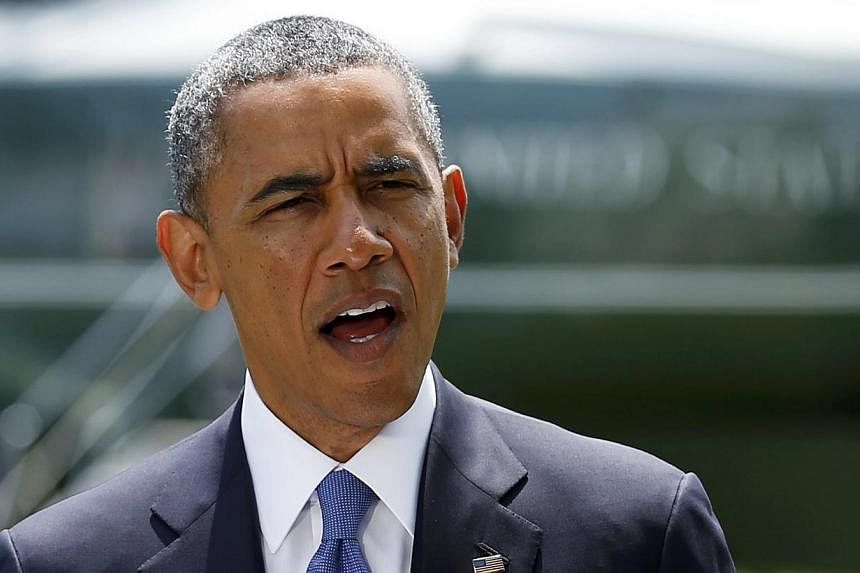WASHINGTON (AFP) - The United States may take military action to support Baghdad in its battle against Sunni extremists but only if Iraq takes steps to heal its sectarian divide, President Barack Obama said Friday.
Mr Obama warned that US ground troops would not be sent back into the country they occupied for eight difficult, violent years, but said recent stunning rebel victories were a threat to US interests.
Amid reports the Pentagon is drawing up plans for air strikes against ISIL, the Sunni jihadist force that has seized the Iraqi city of Mosul, Mr Obama warned that Iraq must also help itself.
"We will not be sending US troops back into combat in Iraq, but I have asked my national security team to prepare a range of other options that could help support Iraqi security forces," he said.
Iraqi Prime Minister Nuri al-Maliki's government has launched its own counter-attack against ISIL, but has also asked the United States to provide military assistance.
Pentagon spokesman Rear Admiral John Kirby declined to say what kind of response was being prepared, adding: "Our job is to provide the commander-in-chief options. We are doing that."
- 'Enormous' US interests -
He confirmed that the US aircraft carrier USS George H.W. Bush and its strike group are in the region and ready to act. The US navy said the carrier group was in the Arabian Sea.
Mr Kirby also said the US military had stepped up intelligence sharing with Iraq "in recent days at the request of the Iraqi government." In brief remarks to reporters at the White House, Obama warned the Baghdad government that it had harmed itself by failing to heal the divides between Sunni and Shi'ite camps in the country.
He admitted that having spent so much money and lost so many US lives in Iraq over the past decade, the United States had "enormous interests" in not seeing the country fall back into chaos.
But he warned this did not imply Washington would intervene without a clear commitment from Baghdad that it would seek a broader political settlement between Iraq's communities.
"The United States will not involve itself in military action in the absence of a political plan by the Iraqis that gives us some assurance that they're prepared to work together," he said.
US forces withdrew from Iraq in 2011, eight years after they had overthrown Iraqi dictator Saddam Hussein, and the American public is loathe to be drawn into another conflict in the Middle East Obama warned that "any action that we may take to provide assistance to Iraqi security forces has to be joined by a serious and sincere effort by Iraq's leaders to set aside sectarian differences."
- 'Ultimately, it's up to the Iraqis' -
He also criticized the readiness of the Iraqi security forces, which received billions of dollars worth of US equipment and training but downed arms and fled when ISIL stormed Mosul this week.
"The fact that they are not willing to stand and fight and defend their posts against admittedly hardened terrorists, but not terrorists who are overwhelming in numbers, indicates that there a problem with morale, a problem in terms of commitment," he said.
"Ultimately that is rooted in the political problems that have plagued the country for a very long time," he added, in another implicit swipe at Maliki's Shi'ite-led government, which has alienated Sunnis.
"So the United States will do our part, but understand that ultimately it's up to the Iraqis as a sovereign nation to solve their problems." Mr Obama also warned that coordinating any military response with Baghdad would take several days and that people "should not anticipate that this is something that will happen overnight." ISIL's seizure of Mosul and a lightning advance southwards by its fighters, hardened by war in neighboring Syria, and other Sunni groups has threatened to push Iraq into sectarian conflict.
On Friday, Iraq's leading Shi'ite cleric Grand Ayatollah Ali al-Sistani urged Iraqis to take up arms against Sunni militants, while Maliki's forces prepared to defend the capital against any attack.
Oil prices, meanwhile, hit a nine-month peak on fears that the unrest would hit Iraqi exports, although Mr Obama played this down as an issue, saying he was sure other Gulf producers would step up.

